The UK government is stepping up to address growing concerns among artists and creators over generative AI tools that mimic their work. A new review has been launched to explore updating “right to personality” laws, potentially offering stronger safeguards against AI companies that use digital content for training their models. This move comes amid rising debates on how generative AI platforms, such as OpenAI’s Sora, are impacting creators.
The review, led by the Labour administration, aims to curb the development of AI tools that allow users to closely replicate the voices, images, or styles of public figures and creators. Key to the proposal is the possibility of requiring AI companies to secure licensing agreements before scraping copyrighted works. This could grant artists greater control over how their content is used, without risking reduced online visibility if they opt out of AI training datasets.
The timing of this initiative aligns with OpenAI’s recent release of Sora, a cutting-edge tool that generates videos from text prompts. While Sora has been praised for its capabilities, it has also triggered backlash. Earlier this year, 300 visual artists and designers invited to test the tool accused OpenAI of artistic censorship and failing to properly compensate creators, highlighting ongoing ethical concerns.
The UK’s proposed changes mirror broader global frustrations around AI’s impact on creative industries. Independent researchers and legal experts have warned that lack of transparency and safeguards could stifle creativity and research while allowing companies to sidestep accountability. A coalition of AI researchers previously urged major firms like OpenAI and Meta to improve transparency and support independent audits to prevent misuse and copyright violations.
With new legislation expected within two years, the UK’s move could set a precedent for balancing AI innovation with artist rights. As the debate intensifies, creators are calling on tech companies to engage in fairer, more transparent practices—ensuring that generative AI works with artists, not against them.





